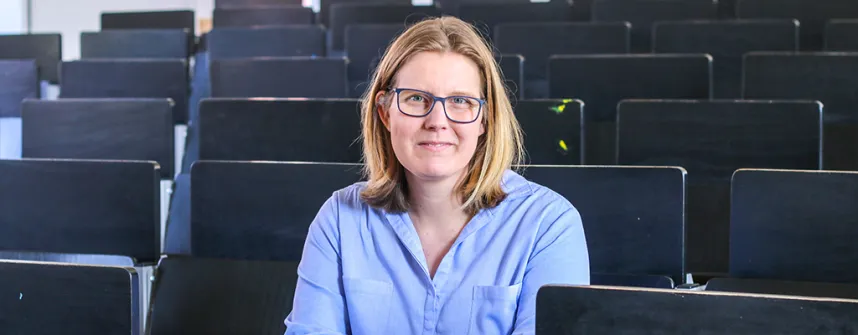Dr. Julia Timpe: "Teaches with passion and dedication"
April 23, 2020
She seems to be doing something right: "Exceptionally well structured and prepared" – "Extremely committed and fair to her students" – "Teaches with passion and dedication". Once a year, Jacobs University’s students choose the best university teachers. Last year, the historian Dr. Julia Timpe won this title in the field of "Diversity", one of the three Focus Areas at the university. And that already for the second time. The coronavirus has also changed her teaching.
The 39-year-old is, of course, delighted about the endorsement from her students. "I didn't bribe anyone and I'm a bit proud," she says with a laugh. "The students should gain something from coming to class. I try to make the classes stimulating and entertaining, try to integrate the students and get into a conversation with them and also make sure that as many as possible contribute something."
Julia Timpe teaches Modern and Contemporary History. She has studied and taught in Germany and the USA, at Brown University and at Harvard University: history, of course, but also German, which she taught, as a foreign language to Americans who did not know a word of the language at the beginning. "You had to be interactive and think of ways to reach them. I’m still using this approach."
In her classes, students are asked to send her questions about course readings, which are then discussed in her seminars. She uses visual elements such as caricatures or short films, and she tries to explain her approach clearly and well. "The students and I have a common goal, we want to work on the content together", she says. "They should understand why I do what I do – so we can do it together".
There is no big mystery to it, she emphasizes, and her classes this year were going well – and then came the virus. Within a week, the entire university, including Julia Timpe, switched in March to online operation, a Herculean task for everyone. "The challenge was to think about how we can achieve our learning goals under the changed conditions," she says. She recorded her lectures, divided them into blocks of about 20 minutes and is now streaming them for her students, until further notice. The discussions in the seminars are continued; her students now come together via video conferencing.
Not only is this labor-intensive, but students’ group work activities as well as their direct interaction with instructors, fall by the wayside. Jacobs University is a campus university: students live together, eat together, attend classes together, and are always in close exchange with lecturers. "It's this camaraderie that defines us," says Timpe. Now, however, in-person teaching activities have been suspended and some students have even returned to their home countries. "Online teaching cannot replace what we had before. It works well, but only for a limited time."
One reason she moved to Jacobs University in 2016 after working at the University of Bremen was the campus and the encounters that come with it. "I feel like I'm back at an American university, but I live in my home country, Germany. This mixture is great for me”, says Timpe, who grew up in Lower Saxony. She is particularly enthusiastic about the internationality of the students, who come from over 120 countries. "International groups are extremely exciting and valuable. No matter what topic is being discussed, you always get to hear different perspectives. It's extremely enriching."
Julia Timpe is not only a teacher. As speaker of the Faculty Council and member of the Academic Senate, she is involved in committee work at Jacobs University. She is also engaged in the coordination of the International Relations: Politics and History (IRPH) program. And she is a researcher. Her particular interest is the everyday history of the Nazi regime. She has published a book about the activities and propaganda of the Nazi leisure organization "Kraft durch Freude" (KdF) in the Third Reich.
Currently, she is also working on the opportunities and challenges of digital humanities and digital history, especially concerning research on the "Third Reich" and the Second World War. She is involved in a project with the Jacobs Robotics Group, headed by Prof. Dr. Andreas Birk, which is digitally capturing the submarine bunker Valentin in Bremen-Farge. A further interdisciplinary research project to investigate the spatial history of National Socialism in Bremen using methods of digital history is in the planning stage. Among other things, a digital map of sites associated with National Socialism in Bremen will be developed. One could say: digitalization looms large in Timpe’s work.
This text is part of the series "Faces of Jacobs", in which Jacobs University introduces students, alumni, professors and staff. Further episodes can be found at www.jacobs-university.de/faces
